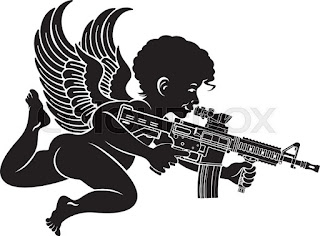by Steve Liskow
Valentines' Day. Flowers, candy, champagne, diamond rings and bended knees. Murder.
Love and Death are the two most important themes in art because once they happen, you can't take anything back. That goes double for mystery writers, both for the crime (motive) and context. A series romance is hard to pull off. Robert Parker had trouble keep Susan meaningfully occupied, and Robert Crais, Michael Connelly, Don Winslow and other writers have ended relationships sadly. If both members don't have a stake in the case, someone has nothing to do.
Dennis Lehane may have done it better than anyone else. Patrick Kenzie and Angie Gennaro knew each other before they became investigators in A Drink Before the War, so their adventures have a deeper contet and the relationship enriches both characters as they make terrible mistakes before they get it more or less right. I wish I'd learned from the instead of painting myself into a corner.
Between 1994 and 1999, Patrick and Angie loved and lost their way through five novels. Patrick is the son of a South Boston fireman who abused the family, and it left lasting scars on the boy. Patrick is a working-class smartass with a chip on his shoulder and a resentment for the rich. He understands that, though, which makes us like him and gives him insight into the people around him. He's very loyal and cagey, lessons he learned by living to grow up.
Angie's grandfather is a ranking member of the Boston Mafia, and she looks at that as little as possible. She's lovely, clever, tough, and lost her virginity to Patrick in high school--after which he dumped her. Since then, they've made every mistake you can imagine. Angie married an abusive husband. Patrick married Angie's sister. Angie divorced her husband, who died. When she and Patrick tried to get back together, she was shot and nearly died, too. During that same book, Darkness, Take My Hand, Patrick faced the demons of his childhood abuse. When Angie's external wounds healed, she went to Europe to figure things out.
Sacred, the third novel, puts the duo in a case involving dysfunctional families that make their own youth resemble Sesame Street. They become lovers again, the case shreds their psyches one more time. Psyche makes context. Patrick and Angie don't live in a vacuum, they interact with people and places, some of them even worse off than they are themselves. Even while you watch them screw up again, you have to give them extra points for effort.
Gone, Baby, Gone deals with abused and neglected children, something they know too well, and ampified because by now they are talking about having a baby themselves. Lehane gives us some of the most insidious characters you can imagine. Nobody is "bad," but they're self-centered, stupid, or worst of all, ineffectually well-meaning. The book's ending may be the most emotionally wrenching moment I remember since I walked home from the Court Street Theater after watching Tommy Kirk shoot Old Yeller.
Prayers for Rain brings the pair together again for the first time in over 18 months. They're older and miserable, finally deciding that being together is better than being alone. Patrick has a hit put on him and Angie does something she's never done before: she asks her Mafia grandfather for a favor. By story's end, Patrick is in the hospital after being shot again.
At that point, Lehane says that Patrick stopped talking to him (Can you blame him?). He left the couple behind and wrote Mystic River and The Given Day, maybe his two best novels, and let the couple slowly recover.
Moonlight Mile appeared in 2010. Patrick and Angie are the same people, but the wounds are catching up and they're slowing down. After ten years, it's almost like meeting them at the high school reunion. That context is still there, and many characters from Gone, Baby, Gone come back. Some of them wiser, but most have merely perfected their own ways of screwing up. Patrick and Angie are married and have a daughter. Patrick thinks of joining a larger firm. The first few chapters are as good as anything Lehane wrote before, but the pace and craziness gradually resolve into something like closure, or maybe what Kubler-Ross would consider acceptance.
Lehane always said that he was afraid that he would kill one of the two--maybe even both--before he got to the end, but they deserved better, and he found a way to give it to them.
Happy Valentine's Day.

